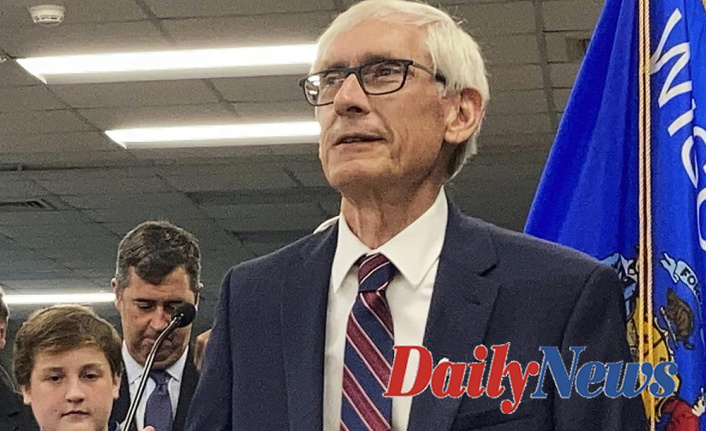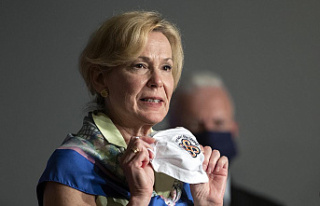He snubbed the bill for the 66th consecutive time since he took office in 2019.
This rejection was yet another reminder of Evers' crucial role in a group of Democratic governors in the most divided states. They provide the only protection against the wave of GOP-backed legislation that targets everything from abortion rights to school curricula to voting.
Evers stated in an interview that "I must prevent some really terrible things from happening." It is lonely, but it is something I do because I am representing Wisconsin's people.
Wisconsin is one the four top priorities of Democrats in an election season where the party faces strong political headwinds. These states, Kansas, Michigan and Wisconsin, are dominated by Republicans. Democratic-held governorships will be on the ballot this fall.
A flood of GOP legislation that was blocked so far would be passed if the governorships are switched parties. This is especially worrying for Democrats regarding voting rights. Evers, Kansas Governor and Laura Kelly are the four incumbents. Laura Kelly, Michigan Governor Gretchen Whitmer, Pennsylvania Governor. Tom Wolf -- have vetoed over a dozen bills that restrict voting.
These moves were especially important in Wisconsin and Michigan, which are all narrowly divided states that could decide 2024's presidential election. They will most likely approve voting restrictions that were rejected if Republicans win governor's races in these states.
Wisconsin is an example of this. The Legislature is moving quickly to pass a number of bills that change election administration and voting rules. Evers is expected not only to veto them all, but also the other Republican candidates for governor support.
The governors play an important role in the organization of presidential elections. Federal law gives extra weight to electors who they believe reflect the winners in their states in any congressional battle over the certification of the next president. In extreme cases, GOP governors might seek to reject Democratic candidates in a presidential race. This is a step former President Donald Trump pressured some Republicans to do in 2020.
Many GOP candidates for governor this year supported Trump’s claim that the last election had been stolen. Last week in Wisconsin, Timothy Ramthun, a conspiracy-theorist who was disciplined last week by Republican leadership for false election claims, filed paperwork for running as governor.
Both federal and state election officials, as well as Trump's attorney general, have stated that there is no evidence of fraud in the election. Courts including Trump's appointed judges, rejected the allegations of fraud made by the former president.
Gov. Roy Cooper, North Carolina's head of the Democratic Governors Association said that the four governors "stand in the breach against Republican State Legislatures' attacks upon voting rights."
Cooper also supports a Republican legislature and said that the governors "protect the foundation of our democratic system."
Republicans claim that Democrats are obstructionists and refusing to work alongside the party that controls their state legislatures.
Phil Cox, a Republican strategist who was also the former executive director for the Republican Governors Association, stated that "an inability to work effectively together with their legislature, regardless if party control is maintained, will eventually be viewed ultimately by voters as failure of leadership."
The Democrats won't limit their efforts this year to defending their position in four of the aforementioned states. They also hope to win Republican-held seats such as those in Massachusetts, Georgia, and Maryland.
The DGA is intensifying its opposition research on Republican candidates in Kansas and Michigan. The Democratic candidates also have large campaign accounts.
According to state campaign records, Evers was worth about $10 million at the end of 2021. Josh Shapiro (the likely Democratic nominee for Governor in Pennsylvania) was worth $13 million. Kelly will face a tougher challenge in Kansas for reelection than she did in 2018. Kelly won in a three way race in 2018. At the end of 2017, she had $2 million.
Whitmer had $10 million in Michigan. A pro-Whitmer advertisement in Michigan was also run by an independent expenditure group associated with the DGA. It cost approximately $200,000 and ran between December and January.
Whitmer has vetoed numerous bills that would make voting more difficult, rejecting nine of these measures in October alone.
"Gov. Whitmer is the backstop for a world in which, if Republicans controlled the legislative chambers or the governor's offices in these states, the stripping of voting rights would automatically become law," stated Patrick Schuh, Michigan director, Democratic-leaning voter accessibility advocacy group America Votes.
One measure would have added additional identification requirements to absentee ballot request forms and prevented the top state election official from sending out vote-by-mail requests widely. Republicans were forced to attempt to overthrow Whitmer with a ballot initiative that Schuh's group hopes will be countered by its own.
Wolf in Pennsylvania blocked similar bills and vetoed a huge bill that would have also reduced the number of drop boxes open for absentee votes. Wolf is finishing his second four year term. Shapiro supports Wolf's vetoes.
These Democrats have some advantages that could benefit them politically in this year's election, including strong budget surpluses, robust state revenue, and outperform dire pandemic predictions. They also have billions of dollars in federal COVID-19 assistance and incoming funding money.
Evers plans to create Wisconsin's largest budget surplus of $3 billion. This includes child care tax credits for working families as well as credits for full-time caregivers for the elderly or homebound. These are moves Evers considers smart and smart investments in extra money when there is a need. The former state school superintendent spoke out in mild manner, saying that he was disappointed by the low expectations and hopes Republicans will "take a closer look."
"I believe the Republicans will find it difficult to say no to this. Evers stated that they have done it before. "Whatever number I vetoed it is, it's nothing compared to what I'm about to veto."












